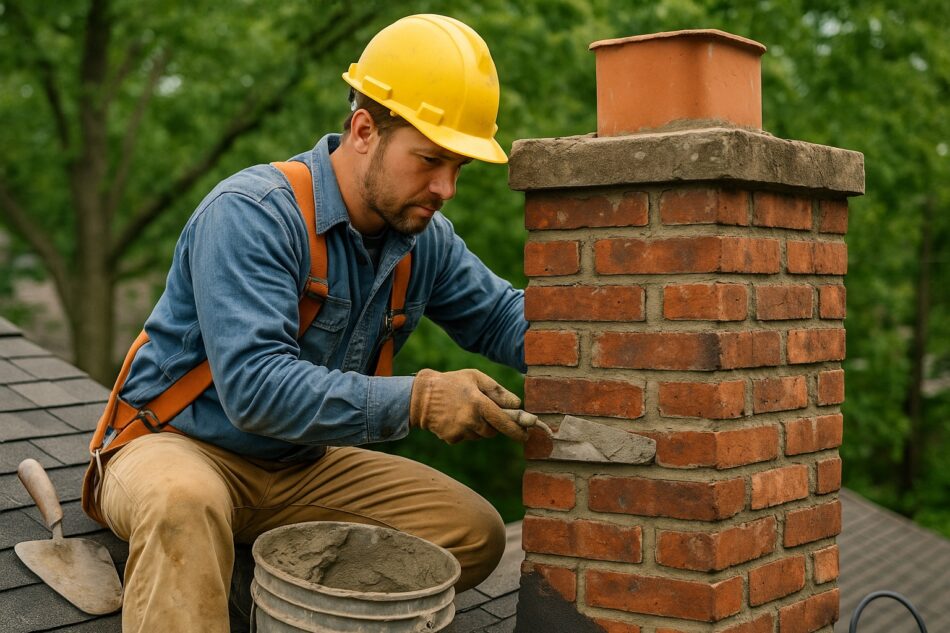If you live in Philadelphia, you know how charming those old brick homes can be—many even have their own fireplaces and tall, stately chimneys. But have you ever taken a close look at your chimney lately? You might be surprised by what you find. Chimneys aren’t just there to give your home that classic look or to let Santa in; they play a big role in keeping your home safe. Over time, though, they can fall apart without you even realizing it. That’s why chimney rebuilds are something homeowners here just can’t ignore.
Cracked Bricks and Wobbly Stacks: Signs Your Chimney Needs Help
Picture this: you’re enjoying a cozy night by the fire, but outside, your chimney might be crumbling brick by brick. Philadelphia’s weather—think heavy rain, snow, and freezing temps—can be tough on chimneys. Bricks can crack, mortar may wear away, and sometimes the whole structure starts to lean or wobble. These aren’t just cosmetic problems.
When bricks or mortar break down, water sneaks in, causing even more damage inside the walls. That moisture can lead to mold or weaken the chimney so much that it could collapse. If you see loose bricks, missing mortar, or even small plants growing out of the chimney, it’s not just time for a quick patch-up; a rebuild might be the only way to make things safe again.
Hidden Hazards: Why a Damaged Chimney Is Dangerous
A chimney that’s seen better days isn’t just an eyesore; it’s a real safety risk. For one thing, cracks and gaps can let poisonous gases like carbon monoxide seep back into your home. That’s scary because you can’t see or smell it, but it’s very dangerous. Next, if your chimney is unstable, falling bricks could hurt someone or damage your roof and yard.
“A neglected chimney is like a ticking time bomb—what you can’t see can hurt you. Regular checks and timely rebuilds are an investment in your family’s safety.”
And don’t forget about fire hazards. If the chimney liner is damaged or missing, heat and flames can reach wooden parts of your house, leading to a potential fire. That’s why experts always stress the importance of keeping your chimney in solid shape.
Philly Weather: The Real Chimney Enemy
Let’s face it, Philly weather is unpredictable. Winters can be icy, while summers bring heavy downpours. All that moisture and temperature change makes bricks expand and contract, which slowly tears things apart. Salt from snow-melting treatments can also eat away at masonry. The older your home, the more likely it is your chimney’s taken a beating.
Here’s a quick look at how Philadelphia’s climate affects chimneys:
| Weather Factor | Effect on Chimneys | What You Might Notice |
|---|---|---|
| Freeze-Thaw Cycles | Cracks expand and bricks loosen | Gaps in mortar, leaning stack |
| Heavy Rain | Moisture seeps in, causing rot and mold | Damp spots, musty odors, moss growth |
| Wind & Storms | Bricks shift, chimney cap may blow off | Missing bricks, debris on ground |
| Age & Wear | Mortar breaks down, liner degrades | Crumbly mortar, visible cracks |
When Is a Chimney Rebuild the Only Option?
Sometimes, a few repairs are all you need. But if your chimney is old, badly cracked, or leaning, patching it just won’t cut it. Rebuilding means taking down the damaged sections—sometimes all the way down to the roof—and starting fresh with new materials. While it sounds like a big project, it’s the only way to make sure your chimney will last for years and keep your home safe.
Think of it like getting a new roof when the old one is too far gone. You wouldn’t want to take chances with something that protects your family, right? The same goes for chimneys. A solid rebuild not only keeps your home safe but also boosts its value and curb appeal.
Frequently Asked Questions
Q: How do I know if my chimney needs to be rebuilt?
A: Look for cracks, missing bricks, leaning, or signs of water damage inside your house near the fireplace. If you notice any of these, get a professional to take a look.
Q: Can I just repair the chimney instead of rebuilding?
A: Small cracks or minor damage can often be fixed, but if the structure is unstable or the damage is widespread, a rebuild is usually the only safe option.
Q: How long does a chimney rebuild take?
A: Most rebuilds take a few days to a week, depending on how much needs to be replaced and the weather.
Q: Is it expensive to rebuild a chimney?
A: Costs vary based on size and materials, but think of it as an investment in your safety and your home’s value.
Wrapping Up: Don’t Wait Until It’s Too Late
Chimneys do more than add character to your Philadelphia home—they keep your family safe from fires and dangerous gases. But only if they’re in good shape. Don’t ignore those cracks or loose bricks! Being proactive with chimney rebuilds means you’ll enjoy peace of mind every time you light that fireplace, knowing your home is safe and sound.
Read More: Philadelphia Chimney Sweep
 WhatsApp Us Now
WhatsApp Us Now




